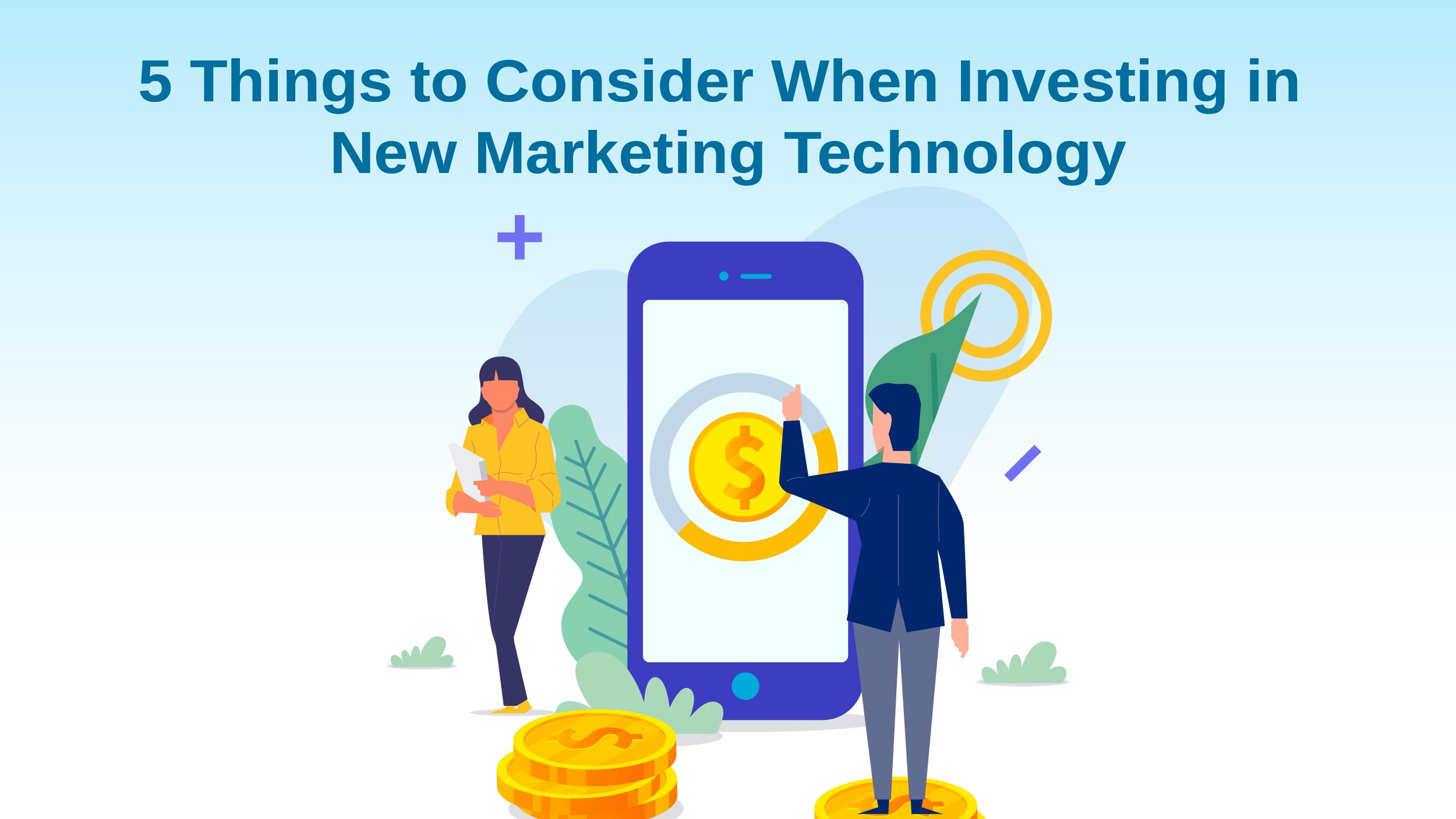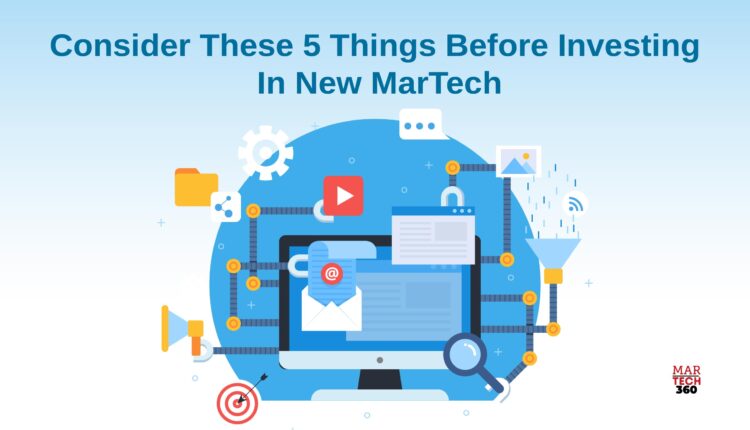There is no lack of marketing technology available, but how can it benefit your company’s success? Does the money, time, and effort employees invest in acquiring and using them really pay off? With global marketing automation tool sales projected to reach $32.6 billion by 2024, marketers are increasingly relying on these tools to boost ROI.
In this blog, we’ve shared five factors that businesses should take into account when navigating the current world of marketing technology in order to assist a customer-centric marketing model.
Let’s get started.
Why Do Businesses Think of Investing in New MarTech?
 Businesses carefully consider the investment of time and money when deciding to change their MarTech. This decision is not made on a whim, but rather in response to specific issues faced by sales and marketing teams. According to a poll by Gartner, 68% of CMOs anticipate raising their MarTech budgets. Furthermore, approximately 70% of technology and sales-as-a-service (SaaS) businesses employ integrated MarTech products.
Businesses carefully consider the investment of time and money when deciding to change their MarTech. This decision is not made on a whim, but rather in response to specific issues faced by sales and marketing teams. According to a poll by Gartner, 68% of CMOs anticipate raising their MarTech budgets. Furthermore, approximately 70% of technology and sales-as-a-service (SaaS) businesses employ integrated MarTech products.
It is also essential to note that addressing immediate pain points is important, however, the successful implementation of MarTech requires going beyond the basics. It involves conducting a thorough analysis to identify the root cause of the issue and addressing it once and for all.
Although there are many trending marketing technologies available, implementing them without careful consideration can worsen the problem in the long term. It’s important to fix issues now to avoid endless pursuit of pain points in the future.
5 Things to Consider When Investing in New Marketing Technology
 Your long-term and short-term objectives should be supported by your MarTech stack strategies. Even if you may currently need to address some urgent business needs, will it reduce or amplify over time? Even though it can be challenging to predict your business requirements, doing so will help you avoid having to rip and replace your MarTech stack.
Your long-term and short-term objectives should be supported by your MarTech stack strategies. Even if you may currently need to address some urgent business needs, will it reduce or amplify over time? Even though it can be challenging to predict your business requirements, doing so will help you avoid having to rip and replace your MarTech stack.
Talking to those in a similar industry who are somewhat further along in their journey can be a useful strategy for learning what to avoid, try, and plan for.
Here are 5 important questions you should ponder before buying new marketing technology:
- Do you use the proper marketing operations procedures?
- What types of data can this new MarTech gather?
- Is the new MarTech effectively combining user-friendliness and integration?
- What are the expenses and the anticipated Return on Investment?
- Does the new MarTech comply with the latest regulations?
Let’s see what these mean.
Also Read: A Comprehensive Guide to Understanding Data Integration
1. Do You Use the Proper Marketing Operations Procedures?
Even whilst having the best MarTech at their disposal, marketers frequently complain that they haven’t implemented the highest levels of internal processes and best practices for marketing operations to make sure that every feature of their MarTech is being utilized to the greatest degree.
Another frequent complaint is the difficulty in combining data and extracting the most important insights from it. Both of the above result in the requirement to develop more robust marketing operations procedures that synchronize with new or existing MarTech investments.
Simply put, this means it is necessary to reflect on how your employees handle the MarTech platform, plan campaigns and content for those systems, and carry out daily analysis of how it is performing.
2. What Types of Data Can this New Martech Gather?
When investing in the new MarTech, it is important to focus on how it will help overcome challenges. Consider how data will be collected and applied, as it forms the foundation for customer analysis and automation. Ensure that the chosen platform can collect the necessary data, assist in analysis, and enable informed decision-making.
Additionally, it is crucial to consider any drawbacks of the new MarTech. Assess whether its data collection approach may harm your marketing, hinder website performance, or violate data privacy.
While it is exciting to anticipate the benefits of new technology, it is equally important to be aware of potential nuances and challenges that may arise during implementation.
3. Is the New MarTech Effectively Combining User-Friendliness and Integration?
When considering a marketing technology, it is crucial to prioritize user-friendliness. If the technology is not easy to use, you may end up avoiding it or spending additional time and money on hiring professionals.
Here are some important characteristics to look for to ensure a good user experience:
- Seamless Integration: Make sure the MarTech can easily communicate with other software, such as customer intelligence or analytical tools. If different technologies are being used, they must function together smoothly to avoid manual data uploading or logging into multiple platforms.
- Clear Metrics: Evaluate whether the metrics provided by the technology are easy to understand, not just for you but for others as well. Ensure that the technology operates as a unified system rather than separate products bundled together, as this can simplify the user experience.
Exercise caution when evaluating marketing technologies that claim to be bundled solutions, as not all of them seamlessly integrate.
4. What are the Expenses and the Anticipated Return On Investment?
Usually, new MarTech consumes a lot of effort and money. Make sure the investment will be profitable. What you plan to receive out of the MarTech platform should be made clear to the supplier, and you should seek them for guidance on what to anticipate.
When beginning a new MarTech partnership, it’s extremely important to have clear objectives and a strategy for achieving ROI, regardless of whether your goals are directly quantifiable in terms of sales or lead generation or more qualitative and intangible.
5. Does the New Martech Comply With the Latest Regulations?
Marketers need to understand that customer privacy is a reality in today’s world. On one hand, data breaches are on the rise, while on the other, data privacy laws are evolving rapidly. Marketers must comprehend how to develop their data governance practices by local rules. A robust data privacy procedure is beneficial for all parties and can increase a customer’s trust in your company.
In a Nutshell
MarTech technology is essential for marketers, but its complexity and lack of clear plans can hinder its full potential. To overcome these obstacles, companies should consider internal marketing tactics, train employees, and involve senior management in the process. By integrating MarTech into their workflow, businesses can reach more consumers, save costs, and gain influence.


Comments are closed.